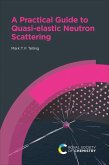Cold atmospheric plasma (CAP) emerges as a possible new modality for cancer treatment. This book provides a comprehensive introduction into the fundamentals of the CAP and plasma devices used in plasma medicine. An analysis of the mechanisms of plasma interaction with cancer and normal cells, including a description of possible mechanisms of plasma selectivity, is included. Recent advances in the field, the primary challenges and future directions are also presented.
Dieser Download kann aus rechtlichen Gründen nur mit Rechnungsadresse in A, D ausgeliefert werden.









